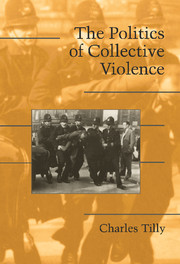2 - VIOLENCE AS POLITICS
Published online by Cambridge University Press: 05 June 2014
Summary
Violent Governments
With collective violence we enter the terrain of contentious politics, where people make discontinuous, public, collective claims on each other. By no means all contentious politics generates violence; our problem is precisely to explain when contention takes a violent turn. But all collective violence involves contention of one kind or another.
We can conveniently mark our crossing into contentious politics' territory by noticing when governments – more generally, individuals or organizations that control concentrated means of coercion – become parties to discontinuous, public, collective claims. Governments become parties to contention as claimants, objects of claims, or stakeholders. When leaders of two Muslim activist groups compete for recognition as valid interlocutors for all Muslims, for example, the governments to which the interlocutors would speak inevitably figure as stakeholders. Similarly, when miners strike against mine owners, government officials may avoid vigorous intervention (or even visible involvement) in the conflict, but government looms nearby as a setter of rules for collective bargaining, a supplier of police, and a possible mediator. Collective violence, then, is a form of contentious politics. It counts as contentious because participants are making claims that affect each other's interests. It counts as politics because relations of participants to governments are always at stake.
Nevertheless, violence and government maintain a queasy relationship. Where and when governments are very weak, interpersonal violence commonly proliferates in the populations under the nominal jurisdictions of those governments. Where and when governments grow very strong, violence among civilians usually declines.
- Type
- Chapter
- Information
- The Politics of Collective Violence , pp. 26 - 54Publisher: Cambridge University PressPrint publication year: 2003
- 2
- Cited by



